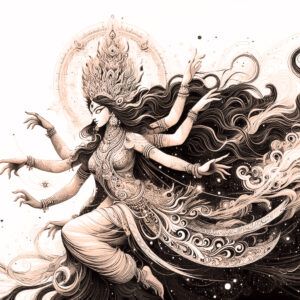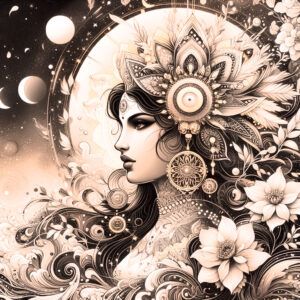
CONCEPT:
Divine Feminine
Pronunciation:
\də-ˈvīn fə-ˈmi-nən\
Definition:
The Divine Feminine is a spiritual concept embodying the nurturing, intuitive, creative, and life-affirming aspects of existence. It encompasses feminine archetypes and qualities found across various cultures and spiritual traditions, often linked with goddesses, the Earth, and natural cycles.
Other Concepts
Deeper Understanding
The Divine Feminine, a concept steeped in ancient mythology and revived in modern spiritual practices, represents the nurturing, intuitive, and creative forces of existence. This universal principle transcends gender, embodying qualities that exist within all beings, regardless of their gender identity. It stands as a counterbalance to the Divine Masculine, which symbolizes assertive, active, and logical attributes.
The roots of the Divine Feminine stretch back to the dawn of human civilization, with ancient cultures venerating goddesses who epitomized fertility, wisdom, and creative power. Isis of Egypt, Demeter of Greece, and Shakti of India are among the many deities that have historically personified the Divine Feminine. These goddesses not only influenced their respective cultures but also left a lasting legacy that continues to resonate in contemporary spirituality.
The resurgence of the Divine Feminine in modern times can be attributed to movements such as feminist spirituality, ecofeminism, and New Age thought. These movements highlight the importance of balancing the masculine and feminine energies to achieve personal and societal harmony. Feminist spirituality, in particular, seeks to reclaim and honor the feminine aspects often marginalized in patriarchal societies.
Scientific evidence, while not directly addressing the Divine Feminine, supports the psychological significance of feminine archetypes. Research underscores the importance of qualities traditionally associated with the feminine, such as intuition, emotional intelligence, and connectedness. According to Marian Woodman and Elinor Dickson in Dancing in the Flames: The Dark Goddess in the Transformation of Consciousness, integrating these aspects can lead to profound personal transformation and well-being.
The Divine Feminine’s relevance today lies in its ability to offer a holistic approach to life, countering dominant patriarchal narratives. It encourages a deeper connection with nature, intuition, and the emotional dimensions of human experience. Embracing the Divine Feminine can foster personal healing, creativity, and compassion, providing a framework for addressing contemporary challenges.
In practical terms, honoring the Divine Feminine involves cultivating mindfulness, empathy, and creativity. Practices such as meditation, ritual, and creative expression can help individuals connect with this energy. Additionally, engaging with nature and recognizing the cyclical patterns of life can enhance one’s appreciation of the Divine Feminine.
The concept of the Divine Feminine serves as a powerful reminder of the need for balance and integration of all aspects of existence. By embracing this principle, individuals can achieve a more harmonious and fulfilling life, enriched by the wisdom and nurturing energy that the Divine Feminine represents.
References
Woodman, Marian, and Elinor Dickson. Dancing in the Flames: The Dark Goddess in the Transformation of Consciousness. Shambhala, 1996.

